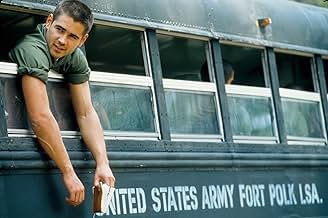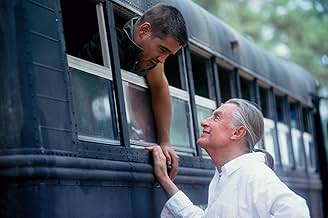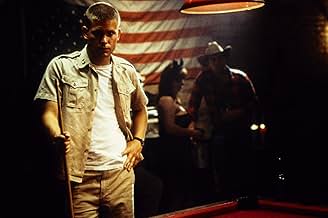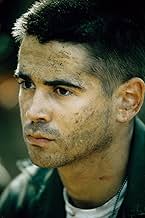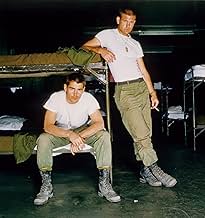CALIFICACIÓN DE IMDb
6.9/10
45 k
TU CALIFICACIÓN
Un grupo de reclutas se somete al entrenamiento avanzado de infantería de Fort Polk, el infame Tigerland de Luisiana, última parada antes de Vietnam para decenas de miles de jóvenes en 1971.Un grupo de reclutas se somete al entrenamiento avanzado de infantería de Fort Polk, el infame Tigerland de Luisiana, última parada antes de Vietnam para decenas de miles de jóvenes en 1971.Un grupo de reclutas se somete al entrenamiento avanzado de infantería de Fort Polk, el infame Tigerland de Luisiana, última parada antes de Vietnam para decenas de miles de jóvenes en 1971.
- Dirección
- Guionistas
- Elenco
- Premios
- 2 premios ganados y 5 nominaciones en total
Tom Guiry
- Pvt. Cantwell
- (as Thomas Guiry)
James MacDonald
- Staff Sgt. Thomas
- (as James McDonald)
- Dirección
- Guionistas
- Todo el elenco y el equipo
- Producción, taquilla y más en IMDbPro
Opiniones destacadas
War drama that takes place in Louisiana in 1971. It follows a bunch of recruits through basic training and then Tigerland--an accurate portrayal of Vietnam on American soil, before they're shipped over. It focuses on two men--Booz (Colin Farrell) and Paxton (Matthew Davis)...how they meet, become friends and deal with a corwardly squadron leader (Clifton Collins Jr.) and a borderline psycho (Shea Wingham).
A surprisingly non-commercial film directed by Joel Schumacher. He uses a hand-held camera throughout most of the movie and uses digital video for the combat scenes. It works very well--the film looks gritty (as it should) and uncomfortably realistic.
Farrell successfully covers up his Irish brogue and adopts a pretty convincing Southern accent. His performance is just superb--he's an extremely talented young man. Davis, unfortunately, is not that good. He's tall, muscular, very handsome--and very bland. The rest of the cast however is just great.
This film was thrown away by its studio. It had no stars in it, a familar story and was considered "just another war film". It only played a week in Boston! It's well worth catching on video or DVD.
Also, Farrell and Davis have a lengthy nude scene.
A surprisingly non-commercial film directed by Joel Schumacher. He uses a hand-held camera throughout most of the movie and uses digital video for the combat scenes. It works very well--the film looks gritty (as it should) and uncomfortably realistic.
Farrell successfully covers up his Irish brogue and adopts a pretty convincing Southern accent. His performance is just superb--he's an extremely talented young man. Davis, unfortunately, is not that good. He's tall, muscular, very handsome--and very bland. The rest of the cast however is just great.
This film was thrown away by its studio. It had no stars in it, a familar story and was considered "just another war film". It only played a week in Boston! It's well worth catching on video or DVD.
Also, Farrell and Davis have a lengthy nude scene.
TIGERLAND / (2000) ***1/2 (out of four)
By Blake French:
Throughout the years audiences have seen and understood war films with every point of view possible, and somehow producers and writers always come up with new and innovative methods of portraying various soldiers on the battlefield. Joel Schumacher ("8MM," "A Time to Kill"), easily one of the riskiest directors currently working, has found resemblance with "The Thin Red Line" in the way his new drama "Tigerland" steps in an individual soldier's shoes. This movie, written by Ross Klavan and Michael McGuther, has more guts and irony than "The Thin Red Line" or even "Saving Private Ryan." Although the movie's dramatic impact is somewhat lessened due to the perversity of the material present, it certainly enlightens us on a new perspective of young men training for war.
I would want to know Joel Schumacher's experiences with the army. Are the men really this unabashed and brutal? I am sure some of them are, but the movie views its uncompromising world through the eyes of a young man named Roland Bozz (Colin Farrell), who is rebellious against the ideas of war. His personality instantly counteracts with several other characters, one who becomes his best friend, Paxton (Matthew Davis), and another, Wilson (Russell Richardson), whose flamed temper often exasperates Bozz's tension with the idea of going to war. The war depicted in this production is not found on a battlefield, but on training grounds of a Louisiana-based instruction camp between conceptions and fears of the soldiers in training. This film is specifically about the preparation for war, nothing more nothing less. It ends when the soldiers finally go to war, kind of disappointing since witnessing the characters in action would have served as a supurb payoff.
Shot on location in about 28 days using 16mm stock and a minuscule budget, Joel Schumacher accurately displays a gritty, perverse, cruel, and unmerciful atmosphere using hand-held cinematography, unique lighting techniques and direct sound. Schumacher's grainy and blown-out images make the movie feel like a documentary feature. This unusual style of filmmaking only contributes to the hard core realism of the movie, quite graphic in its use of coarse language, perhaps a little too disturbing. Waves of four-letter words pound the audience, some in shock of what they are hearing. Even the extreme amount of vulgarism does not keep the dialogue from prevailing as heartbreaking, true, and emotional.
If anything, "Tigerland" provides us with a minor appreciation of how much our soldiers go through for our country in the beginning stages of combat. Such bravery must it take to enlist in the army during times of war, knowing the hardships and risks that are being taken. Such thought-provoking ideas are made possible through the heartbreaking performances by the young aspiring actors who portray the various trainees. This movie is not for all audiences, but one that young men should take a look at before enlisting themselves in the army...and adult audiences should watch to appreciate the courage needed to do such.
By Blake French:
Throughout the years audiences have seen and understood war films with every point of view possible, and somehow producers and writers always come up with new and innovative methods of portraying various soldiers on the battlefield. Joel Schumacher ("8MM," "A Time to Kill"), easily one of the riskiest directors currently working, has found resemblance with "The Thin Red Line" in the way his new drama "Tigerland" steps in an individual soldier's shoes. This movie, written by Ross Klavan and Michael McGuther, has more guts and irony than "The Thin Red Line" or even "Saving Private Ryan." Although the movie's dramatic impact is somewhat lessened due to the perversity of the material present, it certainly enlightens us on a new perspective of young men training for war.
I would want to know Joel Schumacher's experiences with the army. Are the men really this unabashed and brutal? I am sure some of them are, but the movie views its uncompromising world through the eyes of a young man named Roland Bozz (Colin Farrell), who is rebellious against the ideas of war. His personality instantly counteracts with several other characters, one who becomes his best friend, Paxton (Matthew Davis), and another, Wilson (Russell Richardson), whose flamed temper often exasperates Bozz's tension with the idea of going to war. The war depicted in this production is not found on a battlefield, but on training grounds of a Louisiana-based instruction camp between conceptions and fears of the soldiers in training. This film is specifically about the preparation for war, nothing more nothing less. It ends when the soldiers finally go to war, kind of disappointing since witnessing the characters in action would have served as a supurb payoff.
Shot on location in about 28 days using 16mm stock and a minuscule budget, Joel Schumacher accurately displays a gritty, perverse, cruel, and unmerciful atmosphere using hand-held cinematography, unique lighting techniques and direct sound. Schumacher's grainy and blown-out images make the movie feel like a documentary feature. This unusual style of filmmaking only contributes to the hard core realism of the movie, quite graphic in its use of coarse language, perhaps a little too disturbing. Waves of four-letter words pound the audience, some in shock of what they are hearing. Even the extreme amount of vulgarism does not keep the dialogue from prevailing as heartbreaking, true, and emotional.
If anything, "Tigerland" provides us with a minor appreciation of how much our soldiers go through for our country in the beginning stages of combat. Such bravery must it take to enlist in the army during times of war, knowing the hardships and risks that are being taken. Such thought-provoking ideas are made possible through the heartbreaking performances by the young aspiring actors who portray the various trainees. This movie is not for all audiences, but one that young men should take a look at before enlisting themselves in the army...and adult audiences should watch to appreciate the courage needed to do such.
While it was filmed at a Florida National Guard site, "Tigerland" totally reminded me of Fort Polk, LA., firing ranges, maneuver areas, waist-deep water and all. The movie was fairly authentic and the characters similar to those same ones at my AIT in 1974. The difference between the Tigerland year, 1971, and mine of 1974 is all the drill sergeants and instructors knew they weren't going back to Vietnam, as it was pretty much all over, so training was very relaxed - not a challenge at all. That was the precursor to all our troubles in the 70s and 80s, which I know for a fact as I stayed in until 2004. I never heard anyone mention "Tigerland" but the Army did have realistic Vietnam training villages at different bases across the U.S. Vietnam Vets tell me that up to 1972 Basic & AIT could be pretty rough and rugged, because the trainers had been there and were mandated to train Vietnam-bound men those skills to make it, although that was not always the case. Both a drill sergeant at Polk and later one of my Vietnam Vet NCOs, when we had become instructors at a basic training brigade at Fort Bliss, told me there was nothing they could do to get anyone ready and people just had to find out and figure out for themselves. This movie rates high.
American military authority is the enemy for Pvt. Roland Bozz (Colin Farrell), a nonconformist trainee who, along with other infantry trainees, endures brutal, sadistic treatment in preparation for combat in Vietnam. Tigerland is a swampy, steamy camp near Fort Polk, Louisiana that is supposed to simulate conditions in Vietnam. The story is set in 1971.
The amount and severity of physical and verbal aggression displayed in this film may be a tad overstated. But the point the film is making is that many, if not most, of the young guys drafted into the army in the late 60s and early 70s absolutely did not want, or deserve, to be there.
Roland Bozz is one of those young men. He's angry at the war, angry at the army. The army won't release him because they know that's what he wants. If Bozz can't get himself out, the next best thing is to try and get other recruits out. That will be his revenge, his way to fight the system.
A fellow trainee shares his background with Bozz, who then tells the trainee: "I know army regulations the way prisoners know the law. You're a hardship discharge, man, if ever I saw one. Okay. I'll get you out of the army". Bravo for Roland Bozz, a young rebel with a mission, a cause, trapped like the others by an oppressive, controlling institution.
Acting is very, very good. Colin Farrell is terrific, at a time when he, and the rest of the cast, was largely unknown. No need for overpaid A-list actors. The film's acting style trends naturalistic, spontaneous, and emotionally intense. None of the acting seems forced.
With a hand-held camera, combined with grainy film stock, and using quick zooms and unexpected cuts, the cinematography and editing convey a documentary look and feel, which results in sequences that are quite realistic. Lighting is mostly natural. Sets are plain and unadorned. Background music is minimal.
Much better than I ever expected, "Tigerland" is a well-made film with an intense, anti-war theme. It's about putting others ahead of one's own selfish interest. That Hollywood largely shunned this low-budget film is all the more reason to see it.
The amount and severity of physical and verbal aggression displayed in this film may be a tad overstated. But the point the film is making is that many, if not most, of the young guys drafted into the army in the late 60s and early 70s absolutely did not want, or deserve, to be there.
Roland Bozz is one of those young men. He's angry at the war, angry at the army. The army won't release him because they know that's what he wants. If Bozz can't get himself out, the next best thing is to try and get other recruits out. That will be his revenge, his way to fight the system.
A fellow trainee shares his background with Bozz, who then tells the trainee: "I know army regulations the way prisoners know the law. You're a hardship discharge, man, if ever I saw one. Okay. I'll get you out of the army". Bravo for Roland Bozz, a young rebel with a mission, a cause, trapped like the others by an oppressive, controlling institution.
Acting is very, very good. Colin Farrell is terrific, at a time when he, and the rest of the cast, was largely unknown. No need for overpaid A-list actors. The film's acting style trends naturalistic, spontaneous, and emotionally intense. None of the acting seems forced.
With a hand-held camera, combined with grainy film stock, and using quick zooms and unexpected cuts, the cinematography and editing convey a documentary look and feel, which results in sequences that are quite realistic. Lighting is mostly natural. Sets are plain and unadorned. Background music is minimal.
Much better than I ever expected, "Tigerland" is a well-made film with an intense, anti-war theme. It's about putting others ahead of one's own selfish interest. That Hollywood largely shunned this low-budget film is all the more reason to see it.
This movie is done on a low budget. It looks like they used the actual government training center, and many parts were realistic. A few parts of the movie were over the top. This movie is fresh, and gritty; I like the realism of the film. The hero or anti hero is a nice guy, in wolf's skin. (I've met people like him) It shows how cruel the system can be and the merits of playing by your own rules. In the end I like this film.
¿Sabías que…?
- TriviaThe actors had no trailers, make-up artists, hairstylists, chairs or any of the typical luxuries.
- ErroresWhen Bozz brings the truck to a screeching halt with the can in the exhaust pipe, a modern clear plastic water bottle rolls across the truck floor.
- Bandas sonorasSound Off
Written by Willie Lee Duckworth and Bernard Lentz
Selecciones populares
Inicia sesión para calificar y agrega a la lista de videos para obtener recomendaciones personalizadas
Detalles
Taquilla
- Presupuesto
- USD 10,000,000 (estimado)
- Total en EE. UU. y Canadá
- USD 139,692
- Fin de semana de estreno en EE. UU. y Canadá
- USD 26,715
- 8 oct 2000
- Total a nivel mundial
- USD 148,701
- Tiempo de ejecución1 hora 41 minutos
- Color
- Mezcla de sonido
- Relación de aspecto
- 1.85 : 1
Contribuir a esta página
Sugiere una edición o agrega el contenido que falta

Principales brechas de datos
By what name was Camino de guerra (2000) officially released in India in English?
Responda



